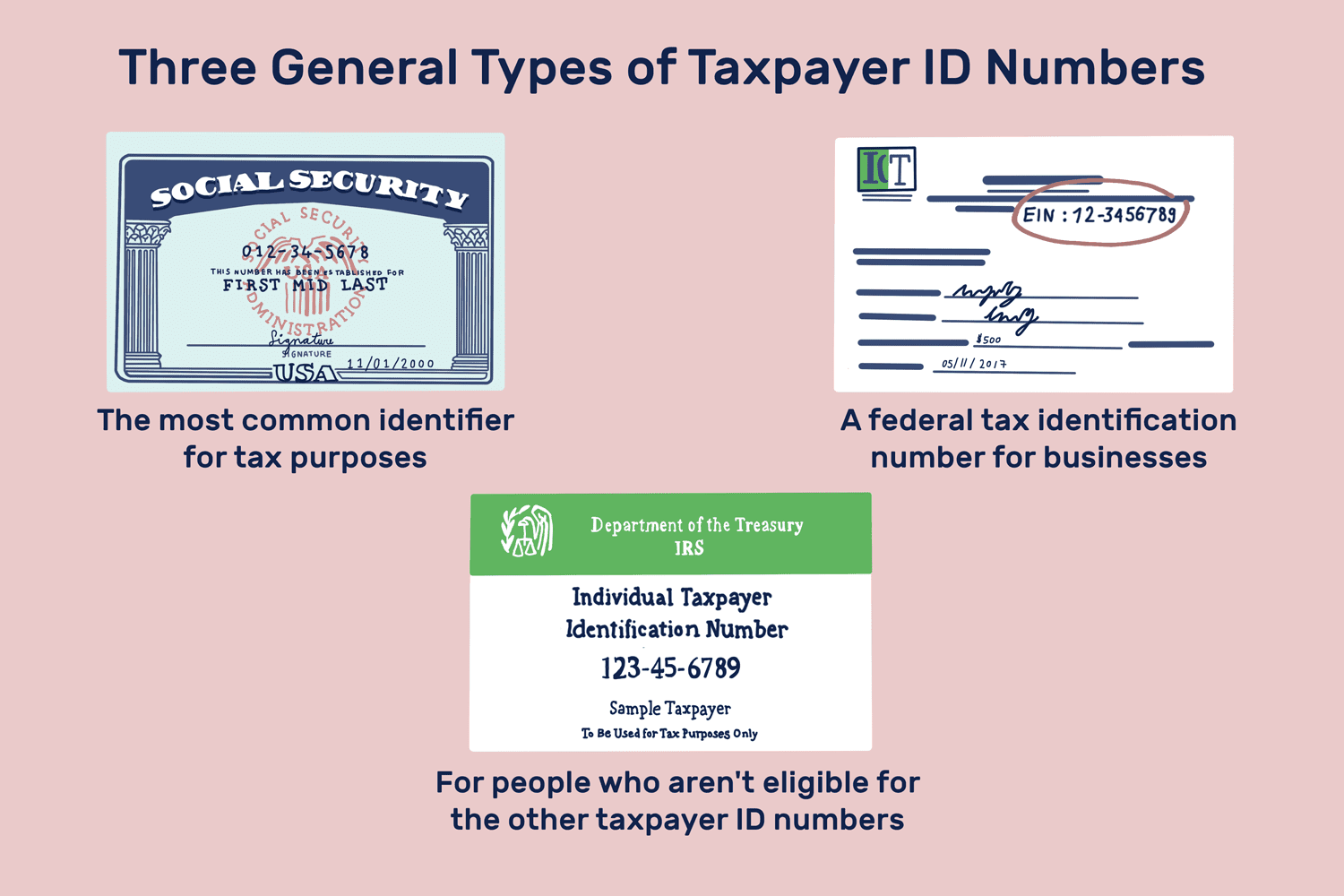Demystifying Tax Identification Numbers (TINs)
A Tax Identification Number (TIN) serves as a pivotal element in the financial landscape, playing a crucial role in taxation and financial transactions. This comprehensive guide aims to unravel the intricacies of TINs, exploring their significance, types, and how they intersect with various aspects of our lives.

Understanding the Tax Identification Number (TIN)
A Tax Identification Number is a nine-digit identifier utilized by the Internal Revenue Service (IRS) for tracking purposes. It is a mandatory component in all tax returns filed with the IRS, ensuring proper identification of individuals, corporations, and entities like nonprofit organizations.
While Social Security numbers (SSNs) are issued by the Social Security Administration (SSA), all other U.S. tax identification numbers are directly issued by the IRS. Foreign tax identifying numbers (foreign TINs) are exceptions, being issued by the respective countries where non-U.S. taxpayers fulfill their tax obligations.
Tax Identification Number: A Unique Identifier
A TIN, also known as a taxpayer identification number, is a unique set of numbers assigned to individuals and entities upon application approval. This identifier is essential for those filing annual tax returns with the IRS. In addition to taxation, TINs play a vital role in various scenarios:
Credit Applications:
Banks and lenders require Social Security numbers for credit applications. This information, shared with credit bureaus, ensures accurate identification and verification of individuals during the application process.
Employment Authorization:
Employers demand SSNs as proof of authorization to work in the United States. These numbers undergo verification with the issuing agency to validate the legitimacy of the individual.
State Agencies and Tax Filings:
Businesses need state identification numbers for tax purposes, issued directly by state taxing authorities. These identification numbers facilitate streamlined filing with state tax agencies.
Types of Tax Identification Numbers (TINs)
Social Security Number (SSN):
The most common TIN, issued to U.S. citizens, permanent residents, and certain temporary residents. SSNs are essential for legal employment, Social Security benefits, and various government services.
Individual Taxpayer Identification Number (ITIN):
Issued by the IRS to nonresident and resident aliens, as well as their spouses and dependents, ineligible for SSNs. ITINs share the same format as SSNs but always begin with a 9.
Employer Identification Number (EIN):
Employed by the IRS to identify corporations, trusts, and estates for tax purposes. EINs, with a format of XX-XXXXXXX, are necessary for reporting capital gains and income.
Adoption Tax Identification Number (ATIN):
Applicable in domestic adoptions when adoptive parents can’t obtain the child’s SSN promptly for tax returns. The child must be a U.S. citizen or permanent resident.
Preparer Tax Identification Number (PTIN):
Required by the IRS since January 1, 2011, for individuals charging to complete all or part of a tax return for others. PTINs ensure accountability and adherence to professional standards.
TINs Across the Globe
TINs are not exclusive to the United States; they are prevalent globally, serving varied purposes. For instance:
Canada: Utilizes Social Insurance Numbers (SINs) for employment, tax, benefits, and credit-related functions.
European Union: Relies on TINs to identify taxpayers and facilitate cross-border financial activities.
Can I Find My TIN Online?
While sensitive in nature, TINs are provided as official documents by the issuing agencies. Retrieving them online is not an option due to security concerns. Individuals can contact the relevant agency, such as the SSA, if they need to obtain or recover their TIN.
Is a TIN the Same As a Tax I.D.?
Yes, a TIN and a Tax Identification Number are synonymous terms. Both refer to the unique identifier assigned for taxation and financial purposes.
Is a TIN the Same As a Social Security Number?
A Social Security number represents a specific type of TIN. While an SSN serves as a TIN, there are other variants like ITINs and EINs catering to distinct circumstances and entities.
Tax Identification Numbers are integral components of financial systems, ensuring seamless taxation processes and proper identification. Whether obtaining credit, securing employment, or filing taxes, TINs play a fundamental role in our financial lives. Understanding the various types of TINs and their applications empowers individuals and entities to navigate the complex terrain of financial transactions, compliance, and accountability. For those venturing into the world of TINs, reaching out to the relevant issuing agencies ensures a secure and informed approach to acquiring and managing these vital identifiers.
Tax Benefits of Insurance
Beyond their role in financial transactions, Tax Identification Numbers (TINs) intersect with another critical aspect of personal finance – insurance. Insurance serves as a safeguard against unforeseen and unfortunate events, providing financial protection and peace of mind. Let’s delve into the symbiotic relationship between TINs and insurance, exploring the tax benefits associated with insurance policies.
The Role of TINs in Insurance
Financial Safety for Family:
Insurance policies offer coverages that protect against life’s uncertainties, ensuring financial stability for your loved ones in the event of your untimely demise.
Safety of Financial Status:
Events like medical emergencies can impact cash flow management significantly. Insurance ensures you don’t have to bear these expenses out of pocket.
Wealth Creation Goals:
Certain insurance policies, like Unit Linked Insurance Plans (ULIPs), provide investment opportunities, helping individuals achieve essential financial goals.
Wealth Preservation:
Life insurance policies, such as endowment and moneyback plans, serve as safe long-term investments, preserving wealth from inflation and taxes.
Wealth Distribution:
Life insurance pension plans guarantee a regular income post-retirement, offering a secure means of wealth distribution over an extended period.
Must-Have Life Insurance Policies
Understanding the pivotal role of insurance in financial planning, here are some must-have life insurance policies:
Term Insurance Plan:
A pure form of life insurance, offering high coverage against a lower premium. Critical illness coverages are also available in some plans.
Health Insurance Plan:
With rising healthcare costs, a health insurance plan is essential. It covers medical expenses and can include critical health insurance for life-threatening conditions.
Motor Insurance:
Mandatory for vehicle owners in India, motor insurance provides coverage against risks like damage and third-party liabilities.
Home Insurance:
Protects homes against risks like theft, natural calamities, etc., ensuring financial security in the face of unforeseen damages.
Tax Benefits Associated with Insurance
Apart from providing financial security, insurance policies offer significant tax benefits:
Life Insurance Premium Deduction (Section 80C):
Individuals can claim a deduction of up to Rs 1.5 lakh on life insurance premiums under Section 80C.
Medical Insurance Premium Deduction (Section 80D):
Deductions of up to Rs 25,000 for self and family, and an additional Rs 25,000 for parents can be claimed under Section 80D. The limit rises to Rs 50,000 for insured senior citizens.
Tax Exemption on Life Insurance Benefits (Section 10(10D)):
Benefits received from life insurance policies, including maturity value and death benefit, are tax-exempted under Section 10(10D).
Intersection of TINs and Insurance
In the realm of insurance, Tax Identification Numbers (TINs) and insurance policies converge to provide a comprehensive financial strategy. The unique identifiers play a crucial role in ensuring compliance, accountability, and seamless transactions within the insurance landscape. As individuals explore the diverse options in insurance coverage, understanding the associated tax benefits empowers them to make informed decisions.
TINs and Insurance – A Synergistic Approach
the synergy between Tax Identification Numbers and insurance policies creates a harmonious financial ecosystem. As individuals safeguard their families and assets through insurance, TINs act as the linchpin, facilitating efficient transactions and adherence to tax regulations. Whether securing the financial future of loved ones or navigating the complex world of tax benefits, the tandem of TINs and insurance plays a pivotal role in shaping a resilient and financially secure tomorrow.






